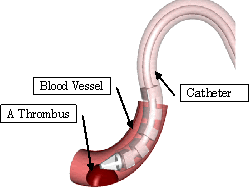 TR Motor TR Motor
TR Motor (Fig.1) has been developed in Toyama Lab. It is a kind of piezoelectoric
actuator, and has two degree of freedom (DOF) motions: translation and
rotation.
Driving principle of the TR Motor
A stator of TR motor has been faricated as a cubic metallic solid with
a through-hole. And polarized piezoelectric elements are bonded to the
four side faces of the stator. By applying alternating voltage to piezoelectric
element, traveling waves are generated on the inside of the through hole.
The characteristic of TR Motor is the simple single stator. It is easy
to manufacture and miniaturize. The advantages of this motor are
1. high positioning accuracy
2. high responsiveness
3. high torque at low speed
4. Usability in the strong magnetic field
|

Fig.1 TR Motor
|

a) The stator |

b)The rotor |
| Fig.2 Micro TR Motor |
|
Background
Recently, greatly decreasing of mortality rate on surgery makes people
hope for improvement of "Quality of Life (QOL)" after the surgery,
or recurrence prevention, complication avoidance, and decreasing of the
scar,and makes people except improvement or spread of minimally invasive
surgery. Now, by going to fuse together Medical Image Processing (for example,
CT or MRI), Information Processing, Precision Engineering, intelligence
robots have used instead of the manpower. In that situation, TR motor has
been expected for the micro-actuator at catheter surgery or surgery assist
robot because of high energy density per unit volume, simple structure,
and little influence in the strong magnetic field, so TR Motor has been
invented. |

Fig.3 Outline of catheter surgery |
Copyright(c)2009 Toyama laboratory. All rights reserved.
|

